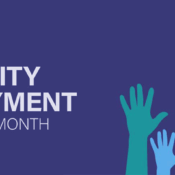
The Accommodation Paradox: When Support Becomes a Burden
We often discuss the importance of accommodations for individuals who are Deaf, DeafBlind, or hard of hearing - and rightly so. They are the key to unlocking access and opportunity. All too often, however, the very accommodations meant to bridge the gap can quickly become a source of frustration, leaving us to defend our communication choices and decisions to ensure access for all.
A recent online exchange with a former colleague resonated deeply with this complex reality. As Deaf, DeafBlind and hard of hearing individuals, we are unfortunately all too familiar with the frustrating situation of working with unqualified sign language interpreters.
His experience mirrored one I know all too well.
The very accommodation intended to provide access instead places an additional burden on us to course-correct in real time.
Despite an interpreter’s physical presence, they may be unable to accurately deliver nuanced content and effectively represent the context of the presentation. This could be for a variety of reasons, ranging from a lack of skills to not having industry knowledge and expertise.
His experience, similar to my own which I shared in last week’s blog post, required him to speak for himself. This highlights another layer of the "double-edged sword."
Interpreters are meant to provide communication access; when they fall short, Deaf, DeafBlind or hard of hearing individuals are left with a difficult choice: struggle with ineffective interpreting or take immediate action.
This left the two of us needing to take on the added burden of communicating in a way that was not our primary or preferred mode. This option to voice for ourselves is a privilege we have that many in our community do not. And, ironically, when we make this decision to adapt our modality and/or speak for ourselves - we’re often left to defend our decision.
This is a crucial layer to the ongoing “double-edged sword” conversation. Why should someone who is already navigating a world not always designed for them have to justify how they choose to communicate, especially when the accommodation is failing?
I’ve personally experienced many misconceptions as a user of both ASL and spoken English. Those who know I speak, often do not understand why I would still want an interpreter to voice for me - at the risk of having information be “lost in translation."
Generally, my default approach during trainings is to sign while my preferred interpreters voice for me. However, not every situation allows for that ideal.
Several years ago, I facilitated a training for faculty of a nursing program, in which my interpreters were wholly unprepared to address the content. Notably, this happened even after I met with the two interpreters, discussing the presentation in detail, to help them prepare in advance.
This forced me in an uncomfortable situation - to “pause” the interpreting and speak for myself.
The aftermath? The Dean of Nursing questioned the need for two interpreters if I was going to speak anyways. Effectively, the two interpreters not being “fully” utilized was perceived as being cost-ineffective and unnecessary.
This left me in an uncomfortable position, having to explain why I chose to forego my requested accommodations and speak for myself. Ultimately, I worry about working with interpreters who don’t know me. I’m always mindful of how they might represent my message - especially in high-stakes environments.
It’s a paradox: relying on interpreters who aren't up to par can undermine your credibility, but choosing to work around them raises questions about why they were needed in the first place.
Here’s the added twist: judgment doesn’t only come from hearing folks. I’ve had to defend the following question from my Deaf peers: “Why are you voicing for yourself if Deaf people are present?” There’s a real and valid concern surrounding representation, language equity, and power dynamics when a Deaf or hard of hearing individual voices for themselves. But when interpreters are unfamiliar or unskilled, what’s the alternative? Once again, the burden falls on the Deaf or hard of hearing professional to both deliver content and justify the method of delivery.
This experience perfectly encapsulates the sheer absurdity of this common situation. Resources were allocated for an accommodation that wasn't effectively delivered, and the individual who had to adapt was then questioned for doing so. It underscores the lack of understanding that simply providing an accommodation doesn't guarantee quality or effectiveness. Certification and licensing, while important, don't always equate to competence.
These unfortunate stories reveal a deeper systemic issue: the burden falls on the Deaf or hard of hearing individual to audit, manage, and even compensate for inadequate accommodations. We are not only navigating our daily lives without hearing, but now must also serve as de facto “quality control” for the very systems meant to support us.
Why should I have to defend my choice to speak when the interpreters are hindering communication? Why should any individual who has experienced the failure of an accommodation then be questioned about the resources allocated for it?
The answer is simple: we shouldn't.
We need to shift the focus from simply providing accommodations to ensuring they are effective and high-quality. This requires:
- A collaborative approach to finding solutions: The focus should be on what works best for the individual, rather than rigid adherence to a potentially flawed system.
- Recognizing the additional labor placed on individuals with disabilities: Having to constantly advocate for effective accommodations and defend communication choices adds an unnecessary layer of burden (also known as a disability tax and, more specifically, for Deaf, DeafBlind and hard of hearing individuals, #TheDDBHHTax).
- Increased accountability for accommodation providers: Whether it's interpreters, captioners, or other services, there needs to be a system that ensures competence and preparation.
- Greater understanding of the diverse needs and preferences of individuals who are Deaf, DeafBlind and hard of hearing: Assumptions about how this population communicates or what accommodations they "should" use are harmful and inaccurate.
The goal of accommodation is to dismantle barriers, not create new ones.
When individuals with disabilities find themselves in a position where they have to defend their communication choices due to the inadequacy of provided accommodations, the system is failing.
Let's move towards a future where the focus is on quality, understanding, and truly equitable access, so that defending our communication becomes a relic of the past.



